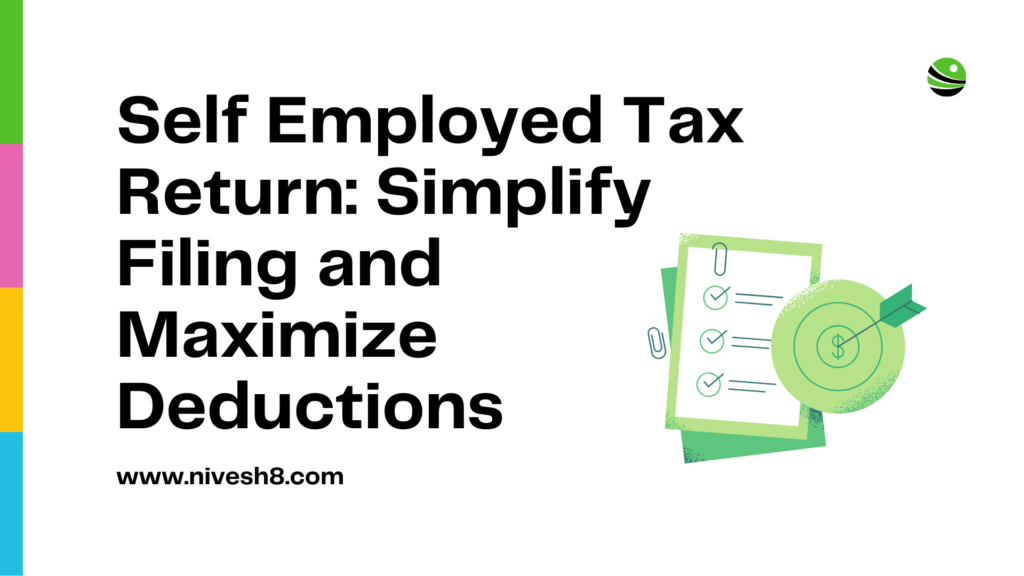Working for yourself in India offers several advantages like freedom and flexibility. Still, it also entails your own tax management obligation. Due to the numerous deductions and compliance requirements involved, filing a self-employed tax return can be challenging. Correct filing of your tax return helps to lower the chance of mistakes and save money.
Describe a Self-Employed Tax Return
For those who make money via self-employment, a self-employed tax return is a tax filing that is unique. Among these could be gig workers, consultants, small business owners, and freelancers. Self-employed workers must calculate, report, and pay their own taxes; salaried workers whose taxes are deducted at source (TDS) are not in charge of these tasks.
Who Should Prepare a Self-Employed Tax Return?
You are needed to submit a self-employed tax return if you fit into any of the following categories:
- Those working as freelancers from several customers.
- Professionals ranging from consultants to doctors to architects.
- Owners of small businesses and solo entrepreneurs.
- Gig labor including online teachers and delivery partners.
- Independent contractors offering goods and services to businesses.
Calculation of Your Self-Employed Tax Return
Use these guidelines to figure your tax due:
- Compute your gross income: Add all of your sources of income—business earnings, freelancing payments, consulting fees, and so on.
- Deduct qualified expenses: Include professional fees, internet bills, office rent, and travel costs.
- Calculate net income: Gross income less allowed expenses yields net income.
- Apply Presumptive Taxation: Under Section 44ADA or 44AD, you can pay tax on a percentage of your income declared as profit.
- Apply tax slabs: To figure your final tax, apply the suitable income slab and rate.
Deductions for Self-Employed Individuals
Claiming deductions will help you greatly lower your tax load. Some important deductions include:
- Section 80C: Up to ₹1.5 lakh for investments in PPF, ELSS, LIC premiums.
- Section 80D: Self and family health insurance premiums.
- Section 80G: Charitable organization donations.
- Business expenses: Rent, utilities, office supplies, travel costs, and internet fees.
- Depreciation: Claim depreciation on assets utilized for company needs.
Organizing Your Self-Employed Tax Return
To file your self-employed tax return online, follow these instructions:
- Register on the Income Tax Portal: If you do not already have an account, register by visiting the official Income Tax e-filing website.
- Download the ITR Form: Usually, self-employed people use ITR-3 or ITR-4.
- Complete your details: Add your personal information, income records, deductions, and tax payments.
- Upload documentation: Include Form 26AS, deduction proofs, and income proof.
- Verify your return: Use Aadhaar OTP, digital signature, or net banking after submission.
Self-Employed Tax Return Deadlines
- For non-audited cases: Due date is July 31.
- For audited cases: Due date is September 30.
- Advance Tax: If your tax due in a financial year exceeds ₹10,000, pay in installments.
Advance Taxes for Independent Contractors
Being self-employed means you have to pay advance tax as follows:
- June 15th: 15% of the tax due
- September 15th: 45% of the tax due
- December 15th: 75% of the tax due
- March 15th: 100% of the tax due
Advantages of Filing a Self-Employed Tax Return
- Ensures legal compliance and helps avoid penalties.
- Claiming all eligible expenses lowers taxable income.
- Helps in better financial planning.
- Necessary for loan or credit card applications.
- Proof of income is essential for financial transactions or visa applications.
Tips for Organizing Your Self-Employed Tax Return
- Keep thorough records: Maintain receipts, invoices, and financial statements.
- Track business expenses: Record every transaction for accurate deduction claims.
- Use accounting software: Automate record-keeping and reduce errors.
- Hire a professional: Consult a Chartered Accountant for complex filings.
- Stay updated on tax laws: Changes in tax laws impact deductions and liability.
Common Mistakes to Avoid
- Missing deadlines: Late filing runs a penalty of up to ₹10,000.
- Not reporting all income sources: Omissions can raise red flags.
- Ignoring advance tax payments: Leads to interest charges.
- Claiming ineligible deductions: May trigger an audit.
- Failing to e-verify your ITR: Can invalidate your submission.
Additional Tax-Saving Tips
- Deduct home office expenses like rent, utilities, and internet if you work from home.
- Claim depreciation on business equipment to reduce tax liability.
- Use tax-saving investments like ELSS and PPF to lower taxable income.
- Opt for presumptive taxation if eligible to simplify compliance.
Final Thoughts
Filing a self-employed tax return does not have to be stressful if you are prepared and organized. Claiming valid deductions and using the proper tax filing techniques can significantly lower your tax liability. Keep accurate records, meet filing deadlines, and seek professional advice if needed. This ensures compliance and helps maximize your savings.



